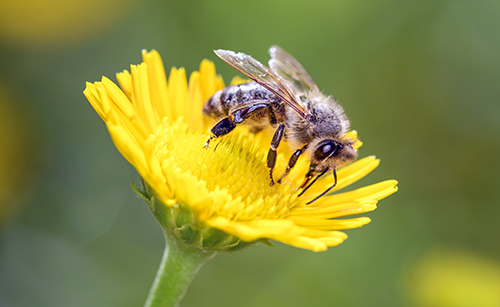A Harmonious Circle
Jun 12, 2023

There are lots of mutually beneficial relationships in nature, but we often do not take advantage of them. One harmonious circle that you may consider, though, is that of gardens, chickens, and bees. This threesome can be utilized on large operations or backyard hobby farms — don’t be scared to start small and upscale as you get more comfortable managing each aspect.
So, how do these two species, with the addition of a garden, help each other out?
Raising chickens with access to your garden can improve chicken health and provide you with healthier eggs. Herbs such as dill, cilantro, marigold, and thyme contain antioxidants, while fennel, basil, coriander, and mint are great sources of protein. Letting your chickens feed on excess produce can even improve egg taste. As they forage, chickens will help keep weeds in check, control pests, and generate compost for your garden.
Chickens will help your bee population thrive as well by preventing insects from infesting the hive. As natural “pest controllers,” they love snacking on hive beetles, ants, and other bugs that may prey on the hives. They will even clean up debris and dead bees from under or near your hives, and frames of old honeycomb can be given to them as a treat.
Bees return the favor through pollination. Bees get the nutrients they need from nectar and pollen, and your garden ends up with more flowers and plants. As your garden grows, your chickens will have more areas to scavenge for healthy snacks, leading to overall healthier hens and eggs.
Now that we’ve seen the cooperative relationship between gardens, chickens, and bees, here are a few more tips to consider:
Your local Co-op carries poultry, beekeeping, and gardening supplies to help you get started in creating a mutually beneficial ecosystem. Supplies vary at each location, so feel free to call ahead for product information or advice. Find the nearest location here.
For more content like this, check out the latest issue of The Cooperator.
So, how do these two species, with the addition of a garden, help each other out?
Raising chickens with access to your garden can improve chicken health and provide you with healthier eggs. Herbs such as dill, cilantro, marigold, and thyme contain antioxidants, while fennel, basil, coriander, and mint are great sources of protein. Letting your chickens feed on excess produce can even improve egg taste. As they forage, chickens will help keep weeds in check, control pests, and generate compost for your garden.
Chickens will help your bee population thrive as well by preventing insects from infesting the hive. As natural “pest controllers,” they love snacking on hive beetles, ants, and other bugs that may prey on the hives. They will even clean up debris and dead bees from under or near your hives, and frames of old honeycomb can be given to them as a treat.
Bees return the favor through pollination. Bees get the nutrients they need from nectar and pollen, and your garden ends up with more flowers and plants. As your garden grows, your chickens will have more areas to scavenge for healthy snacks, leading to overall healthier hens and eggs.
Now that we’ve seen the cooperative relationship between gardens, chickens, and bees, here are a few more tips to consider:
- Ensure you follow local regulations for beekeeping management and raising chickens, especially if you live in a more urban area.
- If you decide to place your hive near your chicken coop, raise the hive off the ground to prevent chickens from getting too close to the entrance.
- When you are working the hives, keep your chickens locked up to keep them from irritating the bees and causing you to get stung.
- Keep a separate, shallow source of water available for your bees that has rocks and branches for the bees to crawl across. If they discover your chickens’ water, they risk drowning or being trampled by chicken activity.
- Do not be concerned if one of your chickens gets stung. It is certainly not life threatening!
Your local Co-op carries poultry, beekeeping, and gardening supplies to help you get started in creating a mutually beneficial ecosystem. Supplies vary at each location, so feel free to call ahead for product information or advice. Find the nearest location here.
For more content like this, check out the latest issue of The Cooperator.